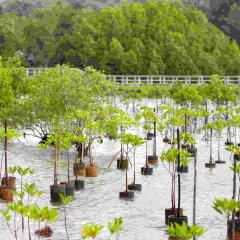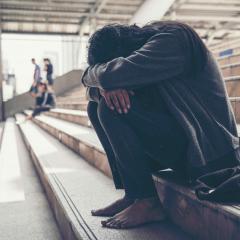A new pilot study is helping Queensland’s small to medium enterprises (SMEs) become more sustainable by designing out waste and using resources more efficiently.
The Circular Economy 4 Business program was developed by Research Fellows Ray Maher and Dr Jennifer Yarnold from The University of Queensland’s Centre for Policy Futures on behalf of and in consultation with the Chamber of Commerce and Industry Queensland’s ecoBiz division.
Dr Yarnold said the Circular Economy 4 Business program was designed to help local businesses reduce their environmental impact, save money, and discover new sources of untapped value.
“Through a guided process, owners and managers map their business plan, supply chains and customers so that they can identify where and why inefficiencies and waste occur.
“This allows them to brainstorm ideas and develop a workable action plan to test and refine the best ideas into viable solutions that can be integrated into their business model,” she said.
Through a competitive selection process, three businesses were chosen to participate in the pilot study:
- The Truss Company: wants to go ‘zero-waste’ to ensure a fully sustainable supply chain.
- Full Circle Fibres: a sustainable textile company whose cotton farms use 70 per cent less water than the global average and aims to reprocess fabric offcuts into yarn - an Australian first.
- Atlas Soils: based in Townsville, turns green waste, weeds, and contaminated soils into HumiSoil - a microbe and humus rich soil improver.
On February 18, teams from each company joined representatives from CCIQ, ecoBiz, and the Queensland Government for an interactive full-day workshop facilitated by UQ’s Centre for Policy Futures at the Global Change Institute.
With the help of their ecoBiz consultant, each team developed a business plan that they will use to test their ideas ‘on the ground’ over the next 12 months. They will be supported by on-going expert consultation, regular milestones, and up to $15,000 in funding.
Mr Maher said the pilot study not only assists businesses to be more environmentally and financially sustainable, but will also inform Queensland Government about the policies that helped the businesses to achieve their goals, or where new policies or regulation could assist.
“There is growing momentum for a circular economy around the world from both governments and businesses big and small.
“The opportunities for Queensland in terms of economic development, new jobs and industries, and achieving emissions and waste reduction targets are enormous,” he said.
Mr Maher said the Queensland Government recognises the positive opportunities of a circular economy to the state.
“The Waste Management and Resource Recovery Strategy provides the framework for Queensland to become a zero-waste society; where waste is avoided, reused and recycled to the greatest possible extent.”
What is a circular economy?
A circular economy is about capturing the untapped value of your business by closing the loop on our ‘take, make, dispose’ approach to business.
From simple solutions to new business models and innovation, the goals of a circular economy are to:
- minimise the amount of materials and products we use – particularly those that are finite;
- put those materials and products we do use to their best use for as long as possible; and
- ensure that materials and products find another purpose once our customers and clients are done with them – instead of throwing good resources into landfill.
For further information, or to discuss circular economy research or training for your organisation, please contact:
Dr Jennifer Yarnold
UQ Centre for Policy Futures
The University of Queensland
T: 0401 031 486
E: j.yarnold@uq.edu.au
Ray Maher
UQ Centre for Policy Futures
The University of Queensland
T: 0478 780 287
E: r.maher@uq.edu.au



